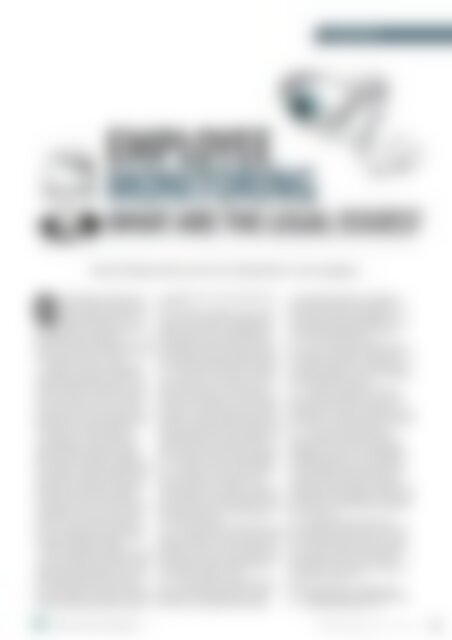201509 CM September
THE CICM JOURNAL FOR CONSUMER AND COMMERCIAL CREDIT PROFESSIONALS
THE CICM JOURNAL FOR CONSUMER AND COMMERCIAL CREDIT PROFESSIONALS
Create successful ePaper yourself
Turn your PDF publications into a flip-book with our unique Google optimized e-Paper software.
HR MATTERS<br />
EMPLOYEE<br />
MONITORING<br />
WHAT ARE THE LEGAL ISSUES?<br />
Gareth Edwards looks at the rise of Big Brother in the workplace.<br />
QUITE reasonably, employers want<br />
to know what their employees are<br />
doing while they are at work. From<br />
a purely practical point of view,<br />
employers want to be sure that employees<br />
are spending their working hours<br />
performing the tasks assigned to them. But<br />
how far can a firm go in checking on staff or<br />
determining what they consume?<br />
Smoking in enclosed or substantially<br />
enclosed public places and workplaces<br />
in England has been banned since 1 July<br />
2007. This means that premises used as<br />
a place of work by more than one person,<br />
or where the public may enter, must be<br />
kept smoke free. The smoking ban covers<br />
manufactured and hand-rolled cigarettes,<br />
pipes, cigars and herbal cigarettes.<br />
However, in a recent case, Insley v<br />
Accent Catering, a school caterer was<br />
asked to attend a disciplinary hearing<br />
having been seen using an e-cigarette in<br />
front of pupils. The caterer resigned before<br />
the disciplinary hearing took place so the<br />
tribunal was not required to decide if the<br />
dismissal was fair. Electronic cigarettes<br />
are unlikely to fall under the statutory<br />
smoking ban as they involve the inhalation<br />
of vaporised mist, rather than smoke. To<br />
prohibit the use of electronic cigarettes<br />
at work, an employer must make it clear<br />
its non-smoking policy that use of thesecigarettes<br />
is expressly prohibited.<br />
Under the Health and Safety at Work etc.<br />
Act 1974, employers have a duty to ensure<br />
a safe place and safe systems of work for<br />
staff. Protecting employees from alcohol<br />
and drugs misuse can be a part of this,<br />
and it is sensible to ensure that employers<br />
have clear rules about coming to work while<br />
under the influence of alcohol or drugs, or<br />
drinking alcohol or taking drugs whilst at<br />
work.<br />
Employers should give some thought<br />
about how to deal with employees who<br />
suffer from alcohol or drug dependency.<br />
While alcohol and or drug addiction are<br />
specifically excluded from amounting to<br />
a ‘disability’ under the Equality Act 2010,<br />
conditions arising from substance misuse<br />
may well meet the definition of disability.<br />
Particular care is required in relation to<br />
employees who are required to drive as<br />
part of their duties – new changes in the<br />
law mean that greater scrutiny is being<br />
placed on ‘drug driving’. It is now illegal for<br />
a person to drive with legal drugs in their<br />
body if those drugs impair their driving. As<br />
always, employers should consider the risk<br />
of being found to be vicariously liable for<br />
their employee's actions and make sure<br />
that their rules and procedures make clear<br />
what conduct would not be acceptable.<br />
Employers may also consider whether<br />
it is necessary to draft a policy to state<br />
that employees must submit to drug<br />
screening. This is only likely to be relevant<br />
where staff drive or operate machinery or<br />
where working under the influence of drugs<br />
could cause injury or could damage the<br />
employer's business.<br />
Even where a drug screening policy is in<br />
place, employers will not be able to require<br />
staff to submit to drug testing without their<br />
specific consent to do so. A monitoring<br />
policy may, however, be drafted to say that<br />
withholding consent will be treated as a<br />
misconduct offence of itself.<br />
Allied to monitoring substance use at<br />
work, an employer may wish to conduct<br />
searches of its employees or property<br />
at work. An employer should exercise<br />
care before searching. If an employer<br />
unreasonably seeks to impose searches,<br />
this could irretrievably damage trust<br />
between employer and employee, risking<br />
an employee resigning and bringing a<br />
constructive dismissal claim.<br />
As ever, the best advice would be to<br />
develop a clear policy setting out when and<br />
in what circumstances an employer can<br />
undertake searches. It is important that an<br />
employer applies any policy consistently to<br />
avoid discrimination claims.<br />
In addition to questions of privacy,<br />
monitoring employee’s use of email and<br />
the internet involves the processing of<br />
personal data and so the impact of the Data<br />
Protection Act 1998 should be considered.<br />
The Information Commissioner,<br />
who oversees compliance with data<br />
protection issues in the UK, has issued<br />
guidance in the form of The Employment<br />
Practices Code, with which employers<br />
should familiarise themselves with before<br />
considering monitoring of employee’s<br />
email and internet usage. Central to the<br />
guidance is that employers undertake a risk<br />
assessment before engaging in monitoring<br />
to confirm, among things, the justification<br />
for monitoring.<br />
Employers must ensure that their<br />
employees understand when and in what<br />
circumstances the content of their email<br />
or internet information will be monitored<br />
or reviewed. At the very least, employers<br />
should ensure that it has an effective<br />
employee monitoring policy in place and<br />
that staff are aware of it.<br />
Gareth Edwards is a partner in the<br />
employment team at Veale Wasbrough<br />
Vizards.gedwards@vwv.co.uk.<br />
The recognised standard in credit management<br />
www.cicm.com <strong>September</strong> 2015<br />
49


















